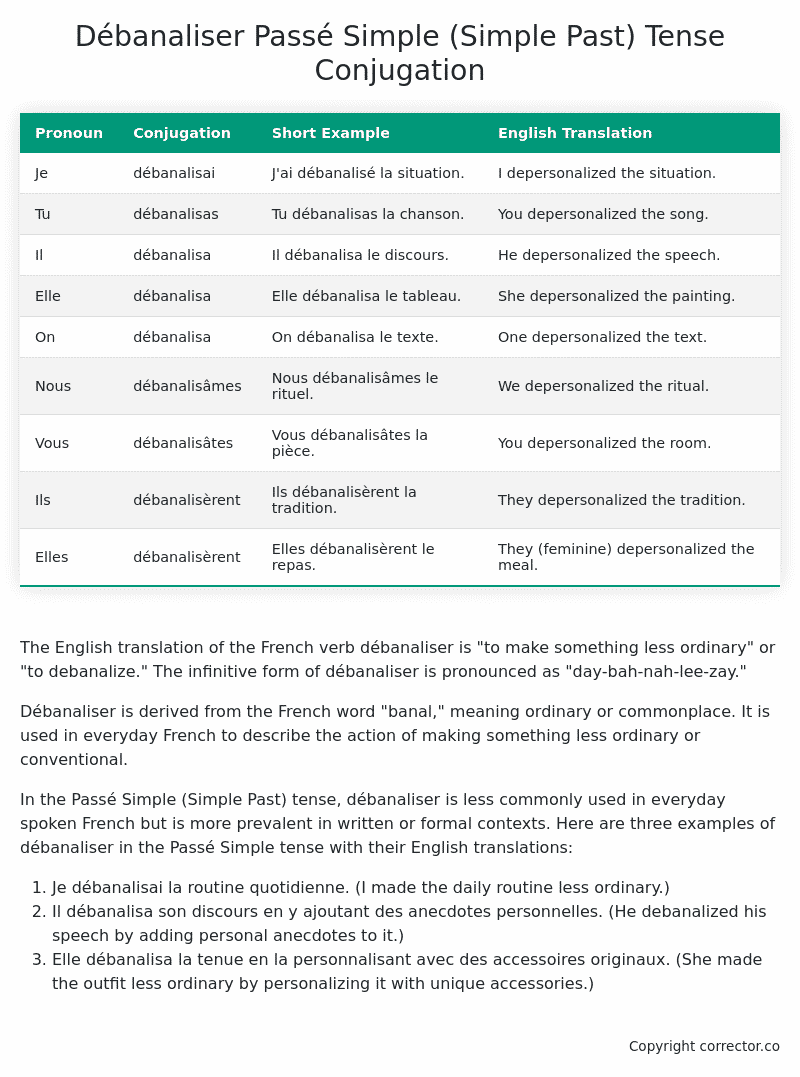Passé Simple (Simple Past) Tense Conjugation of the French Verb débanaliser
Introduction to the verb débanaliser
The English translation of the French verb débanaliser is “to make something less ordinary” or “to debanalize.” The infinitive form of débanaliser is pronounced as “day-bah-nah-lee-zay.”
Débanaliser is derived from the French word “banal,” meaning ordinary or commonplace. It is used in everyday French to describe the action of making something less ordinary or conventional.
In the Passé Simple (Simple Past) tense, débanaliser is less commonly used in everyday spoken French but is more prevalent in written or formal contexts. Here are three examples of débanaliser in the Passé Simple tense with their English translations:
- Je débanalisai la routine quotidienne.
(I made the daily routine less ordinary.) - Il débanalisa son discours en y ajoutant des anecdotes personnelles.
(He debanalized his speech by adding personal anecdotes to it.) - Elle débanalisa la tenue en la personnalisant avec des accessoires originaux.
(She made the outfit less ordinary by personalizing it with unique accessories.)
Table of the Passé Simple (Simple Past) Tense Conjugation of débanaliser
| Pronoun | Conjugation | Short Example | English Translation |
|---|---|---|---|
| Je | débanalisai | J’ai débanalisé la situation. | I depersonalized the situation. |
| Tu | débanalisas | Tu débanalisas la chanson. | You depersonalized the song. |
| Il | débanalisa | Il débanalisa le discours. | He depersonalized the speech. |
| Elle | débanalisa | Elle débanalisa le tableau. | She depersonalized the painting. |
| On | débanalisa | On débanalisa le texte. | One depersonalized the text. |
| Nous | débanalisâmes | Nous débanalisâmes le rituel. | We depersonalized the ritual. |
| Vous | débanalisâtes | Vous débanalisâtes la pièce. | You depersonalized the room. |
| Ils | débanalisèrent | Ils débanalisèrent la tradition. | They depersonalized the tradition. |
| Elles | débanalisèrent | Elles débanalisèrent le repas. | They (feminine) depersonalized the meal. |
Other Conjugations for Débanaliser.
Le Present (Present Tense) Conjugation of the French Verb débanaliser
Imparfait (Imperfect) Tense Conjugation of the French Verb débanaliser
Passé Simple (Simple Past) Tense Conjugation of the French Verb débanaliser (You’re reading it right now!)
Passé Composé (Present Perfect) Tense Conjugation of the French Verb débanaliser
Futur Simple (Simple Future) Tense Conjugation of the French Verb débanaliser
Futur Proche (Near Future) Tense Conjugation of the French Verb débanaliser
Plus-que-parfait (Pluperfect) Tense Conjugation of the French Verb débanaliser
Passé Antérieur (Past Anterior) Tense Conjugation of the French Verb débanaliser
Futur Antérieur (Future Anterior) Tense Conjugation of the French Verb débanaliser
Subjonctif Présent (Subjunctive Present) Tense Conjugation of the French Verb débanaliser
Subjonctif Passé (Subjunctive Past) Tense Conjugation of the French Verb débanaliser
Subjonctif Imparfait (Subjunctive Imperfect) Tense Conjugation of the French Verb débanaliser
Conditionnel Présent (Conditional Present) Tense Conjugation of the French Verb débanaliser
Conditionnel Passé (Conditional Past) Tense Conjugation of the French Verb débanaliser
Conditionnel Passé II (Conditional Past II) Tense Conjugation of the French Verb débanaliser
L’impératif Présent (Imperative Present) Tense Conjugation of the French Verb débanaliser
L’impératif Passé (Imperative Past) Tense Conjugation of the French Verb débanaliser
L’infinitif Présent (Infinitive Present) Tense Conjugation of the French Verb débanaliser
L’infinitif Passé (Infinitive Past) Tense Conjugation of the French Verb débanaliser
Le Participe Présent (Present Participle) Tense Conjugation of the French Verb débanaliser
Le Participe Passé (Past Participle) Tense Conjugation of the French Verb débanaliser
Struggling with French verbs or the language in general? Why not use our free French Grammar Checker – no registration required!
Get a FREE Download Study Sheet of this Conjugation 🔥
Simply right click the image below, click “save image” and get your free reference for the débanaliser Passé Simple tense conjugation!

Débanaliser – About the French Passé Simple (Simple Past) Tense
Formation
Usage
Narration
Historical Context
Interactions with other tenses
Passé Composé
Imparfait
Conditional and Subjunctive
Summary
I hope you enjoyed this article on the verb débanaliser. Still in a learning mood? Check out another TOTALLY random French verb conjugation!


